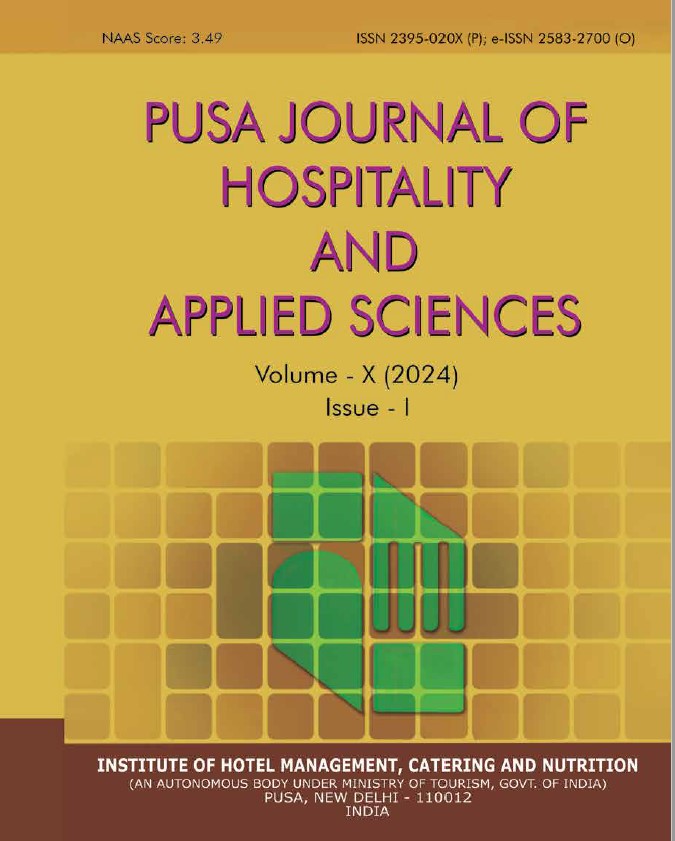Women Entrepreneurs and their Challenges: A Case Study of Lucknow
DOI:
https://doi.org/10.48165/pjhas.2024.10.2.4Keywords:
women, entrepreneurs, business, challenges, governmentAbstract
Background: Eentrepreneurships helps women to become self-sufficient and economically independent, then it is the best way to empower them. Increased entrepreneurship has the capability to empower females politically, socially, and financially. The path of women’s empowerment has given them more power over resources. It is important not just for personal growth but also for the nation’s overall development. Objective: There are two objectives of the study: to study the elements responsible for women to run their business and to examine the challenges struggled by women entrepreneurs in managing their business. Methodology: Quantitative research was done. The data was collected from Lucknow city of Uttar Pradesh state. Convenience sampling was done and 200 respondents were reached for data collection and 195 responses were finalised. A structured questionnaire was made for research and was spread to respondents through Google forms and by personal interview. Mean value and reliability test were used to analyse the data. Results: The Cronbach’s static value was found 0.975 which is acceptable for the study. The weighted mean score it has been found that aspire to be independent ranked 1st (weighted mean score 2.8). Women requires financial need to run the business ranked 2nd (weighted mean score 2.7). Confirmation of family and career security are two important pillar to boost confidence in oneself ranked 3rd (weighted mean score 2.3). Women faced challenges for building infrastructure for their business ranked 1st (weighted mean score 3.5). Budgetary restrictions was the major issue for women entrepreneurs ranked 2nd (weighted mean score 3.4). Low mobility was third largest issue for the entrepreneurs ranked 3rd (weighted mean score 3.3). Conclusion: The study concludes that if women focus on the challenges faced by them in running business, they can overcome the issues. Proper training is always required of the concerned business and majorly help from Government and NGO’s can change the status of the women.
References
Ayadurai, D. (1985). The employer, the employee and the law in Malaysia. Butterworths. The employer, the employee, and the law in Malaysia by Dunston Ayadurai | Open Library
Barwa, S. D. (2003). Impact of Start Your Business (SYB) training on women entrepreneurs in V i e t n a m . Hanoi: ILO Office in Vietnam.
Boden Jr, R. J., & Nucci, A. R. (2000). On the survival prospects of men’s and women’s new b u s i n e s s ventures. Journal of business venturing, 15(4), 347-362.
Chavan, V. M., & Murkute, P. A. (2016). Role of women entrepreneurship in Indian economy. International Journal of Science Technology and Management, 5(3), 604 612.
Das, M. (2000). Women entrepreneurs from India: Problems, motivations and success factors. Journal of Small Business & Entrepreneurship, 15(4), 67-81.
Dhameja, S. K. (2002). Women Entrepreneurs: Opportunities, performance and problems. Deep and Deep Publications.
Dhekale, V. S. (2016). Performance of women entrepreneurship in India. International Journal of Management (IJM), 7(1), 201.
Du Rietz, A., & Henrekson, M. (2000). Testing the female underperformance hypothesis. Small B u s i n e s s Economics, 14, 1-10.
Garg, S., & Agarwal, P. (2017). Problems and prospects of woman entrepreneurship–a review of literature. IOSR Journal of Business and Management, 19(1), 55-60.
Kalyani, A. L. N. S., & Mounika, G. S. (2016). Factors influencing female entrepreneurship. Anveshana’s International Journal of Research in Regional Studies, Law, Social Sciences, Journalism and Management Practices, 1(8), 54-60.
Karim, N. A. (2001). Jobs, gender and small enterprises in Bangladesh: factors affecting women entrepreneurs in small and cottage industries in Bangladesh (No. 993467103402676). International Labour Organization.
Kim, J. L. S., & Ling, C. S. (2001). Work-family conflict of women entrepreneurs in Singapore. Women in Management review, 16(5), 204-221.
Koneru, K. (2017). Women entrepreneurship in India problems and prospects. Available at S S R N 3110340.
Kumar, D., & Kalyani, B. (2011). Motivational factors, entrepreneurship and education: Study with reference to women in SMEs. Far East journal of psychology and business, 3(2), 14-35.
Kumari, S., Kaushik, V., & Lodha, N. (2010). Problems faced by rural women entrepreneurs of Rajasthan. Studies on Home and Community Science, 4(2), 115-119.
Magd, H., & Thirumalaisamy, R. (2021). Women Entrepreneurship in Oman-Possibilities and Challenges. Global Business & Management Research, 13(3).
Mauchi, F. N., Mutengezanwa, M., & Damiyano, D. (2014). Challenges faced by women entrepreneurs: A case study of Mashonaland Central Province. International Journal of Development and Sustainability, 3(3), 466-480.
McGowan, P., Redeker, C. L., Cooper, S. Y., & Greenan, K. (2012). Female entrepreneurship and the management of business and domestic roles: Motivations, expectations and realities. Entrepreneurship & Regional Development, 24(1-2), 53-72.
Mogaji, E. (2023). Women entrepreneurs in transport family business: A perspective article. Journal of Family Business Management, (ahead-of-print).
Mondal, B., & Ghosh, S. (2024). An exploratory study on the cultural barriers impacting women entrepreneurship in the hospitality industry in India. PUSA Journal of Hospitality and Applied Sciences, 10(1), 64-70.
Sahoo, C. (2020). Women Entrepreneurship in India: An Insight into Problems, Prospects and
Development. International Journal of Engineering Research & Technology, 9(09).
Saraswat, R., & Lathabahvan, R. (2020). A study on Women Entrepreneurship in India. Mukt Shabd J o u r n a l , 9 , 3422-3432.
Sharma, V., & Gaur, M. (2020). Women entrepreneurs in India: A study of opportunities and challenges. Journal of Xi’an University of Architecture & Technology, 12(7), 1307-1317.
Singh, N. P. (1985). Potential Women Entrepreneurs: Their Profile, Vision, and Motivation.National Institute for Enterpreneurship and Small Business Development.
United Nations Industrial Development Organization, Vienna, (2003), Developing Rural and W o m e n Entrepreneurship. 03-81817_txt.qxd.
Watson, J. (2003). Failure rates for female‐controlled businesses: Are they any different?. Journal of small business management, 41(3), 262-277.
Winn, J. (2005). Women entrepreneurs: can we remove the barriers?. The International Entrepreneurship and Management Journal, 1, 381-397.
Yordanova, D. I. (2011). The effects of gender on entrepreneurship in Bulgaria: An empirical study. International Journal of Management, 28(1), 289.




